I have created a RESTful API that has an optional parameter passed in as a URL variable. It seems to work correctly when executing from the browser directly but when trying it in the API Explorer it lists the parameter but ignores it when executing it. I have no idea where to start to look in solving this. Any help would be greatly appreciated.
The class definition is as follows:
class actions {
/**
* LIST available Actions
*
* List all the actions that a user (or app) can choose from. The response list
* will include [name],[slug/id], and [description] attributes. If you want a more complete set of
* meta attributes for the actions then you can specify "meta=all" in the request url. For full spec of
* response please review LG_actions_list.json.
*
* @url GET /available
*
* @param $meta {@from url} Optional parameter to control the amount of meta-data passed back. Values are "none","normal", and "all"
**/
public function available ($meta="normal")
{
return "list actions (meta level set to $meta)";
}
}
In this case I can type "all" as the value of $meta in the API explorer but the response is still "list actions (meta level set to normal)".
UPDATE:
In order to clarify this behaviour I am adding the API Explorers output and the output I get when I call the service directly:

In comparison, when actually using the API I get the correct results. Typing this into Chrome:
I get the desired output of:
"list actions (meta level set to foobar)"